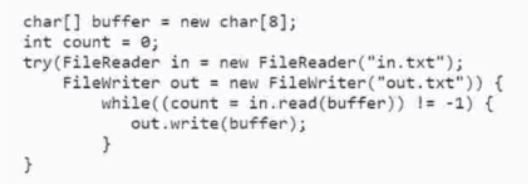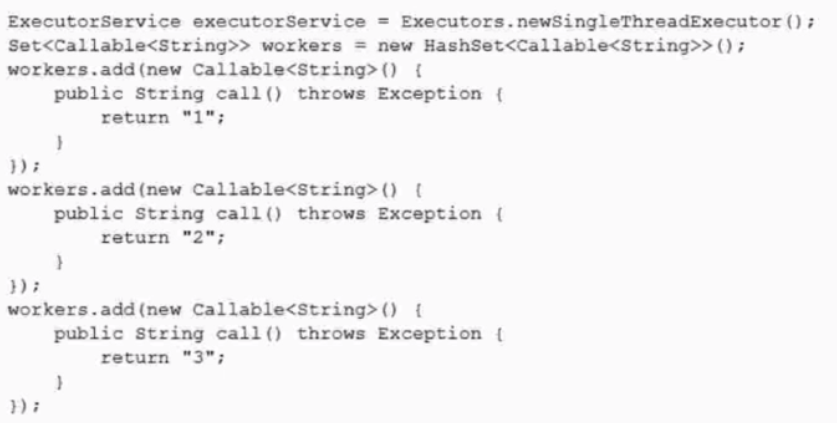At ValidExamDumps, we consistently monitor updates to the Oracle 1Z0-829 exam questions by Oracle. Whenever our team identifies changes in the exam questions,exam objectives, exam focus areas or in exam requirements, We immediately update our exam questions for both PDF and online practice exams. This commitment ensures our customers always have access to the most current and accurate questions. By preparing with these actual questions, our customers can successfully pass the Oracle Java SE 17 Developer exam on their first attempt without needing additional materials or study guides.
Other certification materials providers often include outdated or removed questions by Oracle in their Oracle 1Z0-829 exam. These outdated questions lead to customers failing their Oracle Java SE 17 Developer exam. In contrast, we ensure our questions bank includes only precise and up-to-date questions, guaranteeing their presence in your actual exam. Our main priority is your success in the Oracle 1Z0-829 exam, not profiting from selling obsolete exam questions in PDF or Online Practice Test.
Which statement is true about migration?
The answer is B because a bottom-up migration is a strategy for modularizing an existing application by moving its dependencies to the module path one by one, starting from the lowest-level libraries and ending with the application itself. This way, each module can declare its dependencies on other modules using the module-info.java file, and benefit from the features of the Java Platform Module System (JPMS), such as reliable configuration, strong encapsulation, and service loading.
Option A is incorrect because a top-down migration is a strategy for modularizing an existing application by moving it to the module path first, along with its dependencies as automatic modules. Automatic modules are non-modular JAR files that are treated as modules with some limitations, such as not having a module descriptor or a fixed name. A top-down migration allows the application to use the module path without requiring all of its dependencies to be modularized first.
Option C is incorrect because a top-down migration does not require any specific order of migrating modules, as long as the application is moved first and its dependencies are moved as automatic modules. A bottom-up migration, on the other hand, requires the required modules to migrate before the modules that depend on them.
Option D is incorrect because unnamed modules are not automatic modules in any migration strategy. Unnamed modules are modules that do not have a name or a module descriptor, such as classes loaded from the class path or dynamically generated classes. Unnamed modules have unrestricted access to all other modules, but they cannot be accessed by named modules, except through reflection with reduced security checks.Reference:
Oracle Certified Professional: Java SE 17 Developer
OCP Oracle Certified Professional Java SE 17 Developer Study Guide
Migrating to Modules (How and When) - JavaDeploy
Java 9 Modularity: Patterns and Practices for Developing Maintainable Applications
Given the content of the in. tart file:
23456789
and the code fragment:

What is the content of the out .txt file?
The answer is D because the code fragment reads the content of the in.txt file and writes it to the out.txt file. The content of the in.txt file is ''23456789''. The code fragment uses a char array buffer of size 8 to read the content of the in.txt file. The while loop reads the content of the in.txt file and writes it to the out.txt file until the end of the file is reached. Therefore, the content of the out.txt file will be ''0123456789''.
Given the course table:

Given the code fragment:

The code fragment will execute the update statement and set the course fee of the course with ID 1021 to 5000. The executeUpdate method returns an int value that indicates the number of rows affected by the SQL statement. In this case, only one row will be updated, so the result variable will be 1. The if statement will check if the result is greater than 0, which is true, and print ''Updated successfully''. Therefore, the output of the code fragment is true.Reference: https://education.oracle.com/products/trackp_OCPJSE17, https://mylearn.oracle.com/ou/learning-path/java-se-17-developer/99487, https://docs.oracle.com/en/java/javase/17/docs/api/java.sql/java/sql/Statement.html#executeUpdate(java.lang.String)
Given the code fragment:

Which code fragment invokes all callable objects in the workers set?
A)

B)

C)

D)
